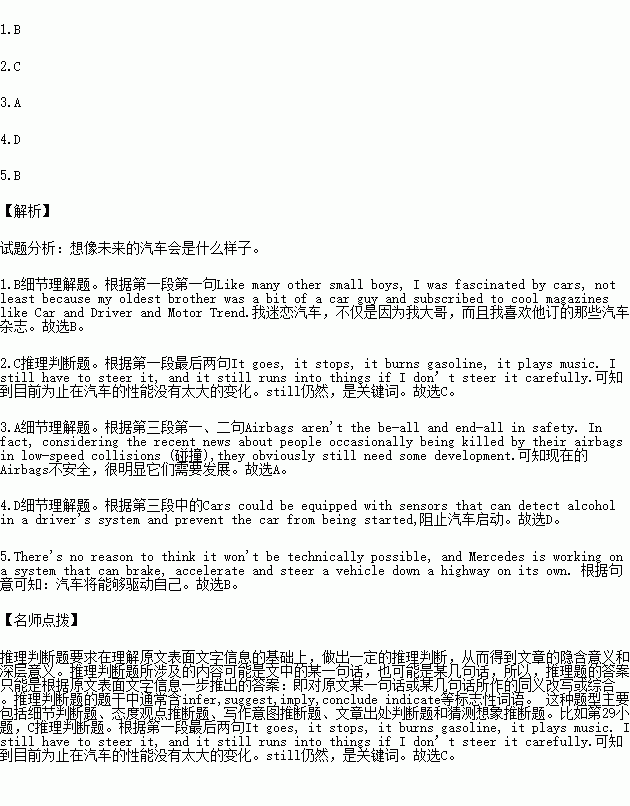题目内容
Like many other small boys, I was fascinated by cars, not least because my oldest brother was a bit of a car guy and subscribed to cool magazines like Car and Driver and Motor Trend. Every so often, one of those magazines would run an article on the “Car of the Future”. They featured unconventional styling and things like small nuclear reactors as power sources. Yet, frankly, my car doesn’t do anything that my brother’s Studebaker didn’t do. It goes, it stops, it burns gasoline, it plays music. I still have to steer it, and it still runs into things if I don’t steer it carefully.
But guess what? All of these things are subject to change in the not-so-distant future. It will still go and stop, but it may not burn gasoline, I may not have to steer it, and it may be a lot better at not running into things.
Airbags aren't the be-all and end-all in safety. In fact, considering the recent news about people occasionally being killed by their airbags in low-speed collisions (碰撞),they obviously still need some development. But they aren't going away, and in fact, you can expect to see cars appearing with additional, side-impact airbags, something some European car manufacturers already offer.
Better than systems to minimize (使减少到最低限度) injury in the event of an accident, however, are systems that minimize the likelihood of an accident happening in the first place. Future cars may be able to eliminate many of the major causes of accidents, including drunk-driving, tailgating (与前车距离过近) and sleepiness. Cars could be equipped with sensors that can detect alcohol in a driver's system and prevent the car from being started, for example. Many accidents are caused by people following the car in front too closely. As early as next year, you'll be able to buy cars with radar-equipped control systems. If the radar determines you're closing too quickly with the car in front, it will ease up on the throttle (油门). For city streets, expect other radar devices that will give advance warning that the car in front of you has slowed abruptly (突然地) and you should step on the brakes-or that may even brake for you.
Will cars eventually be able to drive themselves? There's no reason to think it won't be technically possible, and Mercedes is working on a system that can brake, accelerate and steer a vehicle down a highway on its own. Nobody really expects people to give up all control to their cars, but such systems could be used as failsafe systems to keep cars on the road and bring them safely to a stop even if the driver suddenly became disabled.
1.Why was the author fascinated by cars?
A. Because other small boys liked to own a car of their own, too.
B. Because he read exotic things about cars in his brother's magazines.
C. Because his oldest brother loved to take him to places in his car.
D. Because he subscribed to cool car magazines.
2.By saying "my car doesn't do anything that my brother's Studebaker didn’t do", the author means that_____.
A. my car is far better than my brother's
B. my car is not as good as my brother's
C. not much has changed in the performance of cars so far
D. much improvement has been made in the design of cars recently
3.Which of the following statements is true of airbags?
A. They are in need of further improvement.
B. They are going to disappear gradually.
C. They kill people instead of protecting them in low-speed collisions.
D. They are a standard feature of European cars.
4.According to the author, what will future cars do if the sensors detect alcohol in the driver's system?
A. They will give a warning in advance.
B. They will brake automatically.
C. They will ease up on the throttle.
D. They will not start.
5.Which of the following statements is true according to the last paragraph?
A. People will give up all control to their cars.
B.Cars will be able to drive themselves.
C. No cars will ever break down on the roads.
D. Cars will all be equipped with failsafe systems.
 阅读快车系列答案
阅读快车系列答案
